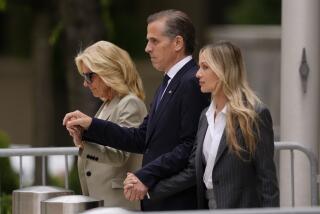The Danger of Overreaching for Justice
- Share via
WASHINGTON — Any country that endures a long war has plenty to answer for. The scarred lanes and impromptu roadside graveyards in Kabul, like those across Afghanistan, tell two decades of stories about violence, deprivation, heroism and forbearance. Some of these tales will be included in a highly charged independent commission report on ethnic killings that Afghan leader Hamid Karzai will release soon. Others will emerge from a commission on truth that he is committed to establishing. But in the recounting of human-rights abuses, Afghanistan’s past can derail its future. Afghans are starting down a long road toward political stability, but without a system to deliver simple justice, they may be unable to resolve problems that make political reconciliation possible.
The consequences of old conflicts still tear at the seams of Afghan society and contribute to an environment of uncertain justice. As the interim government knows too well, this can easily lead to more fighting. This is why Karzai insists that Afghanistan cannot wait to confront its past. Wary observers fear that his frail government cannot handle revelations of past misconduct. Rights advocates, however, fear that Afghans cannot create a durable society without airing grievances and bringing bad actors to justice. Both may be right.
Take the problem of fair trials. Last month, the minister of civil aviation and tourism, Abdul Rahman, was killed during an altercation at Kabul airport. Some blame impatient religious pilgrims whose flight to Mecca never arrived; others believe he was the target of a political vendetta. Karzai quickly accused rival Cabinet members of conspiracy to murder Rahman and declared that they would stand trial under the Afghan constitution. The Cabinet members have denied responsibility.
But whose court, which laws, whose statutes, which constitution? Like many countries in political transition, Afghanistan does not yet have a fully functioning justice system. The December Bonn agreement that empowers Karzai and lays out a route to a future government revived the 1964 constitution, but it doesn’t specify what will replace the outdated monarchy or how the fragmented Cabinet will get along. Three months into his six-month term, Karzai can sign treaties, entice international donors and choose judges, yet even with billions of dollars in aid pledges, he can’t establish the conditions that will make justice accessible to all Afghans.
If fair laws and courts are not accessible--for every Afghan, not just for Rahman’s alleged killers--just imagine how difficult it will be to air charges against human-rights abusers. Every individual who exposes dangerous truths about people in power takes a personal risk; so do judges who hear their grievances. In countries far more stable than Afghanistan, truth and reconciliation commissions have been frustrating and occasionally dangerous. In Latin America, where courts helped restore democracy, public accusations of rights violations by prominent persons sometimes led to murder. South Africa’s Truth and Reconciliation Commission was an essential part of its transition to majority rule, but even there, communities committed to fundamental change learned bitter lessons about trusted political leaders.
Even simple justice is hard to guarantee. In neighboring Pakistan and Kyrgyzstan, courts are often used for retribution, and journalists and witnesses die. In places as different as Argentina, Chile and East Timor, experience has shown that political and social reconciliation happens only when citizens feel confident that their government can protect them. Afghanistan--where war continues, ordinary crime is rising and armed men take pot shots at international peacekeepers on Kabul’s street corners--may find that it is too soon to incur the high cost of political retrospection.
Fostering a climate of accountability is a fine idea, but the order of business needs to be reversed. First, build the state, then judge its past. Create a plausible political process to establish the bona fides of those who seek to rule. Protect vigilantly the right to question--and do so by ensuring that universal-rights protections are enshrined in law.
The prerequisites for confronting Afghanistan’s past lie in the country that Afghanistan can become. It can best face risks by recreating a state in the image of its aspirations--a functioning civil service, credible judges, and representative political institutions that make it possible for Afghans to take a leap of faith out of the morass of war toward something that resembles peace.
This is the chance that the Bonn agreement, imperfect though its solutions are, offer Afghanistan. Karzai will soon have to decide how to deal with prisoners of war, respond to U.S. courts hearing cases against the Taliban, and cooperate with international courts and U.S. military tribunals that will be convened to judge members of Al Qaeda. His hands will be strengthened if Afghanistan makes local justice the first building block of its renewed state.
Justice is a looking glass that refracts the past by framing the future. More than 20 million Afghans have the right to see justice done, and even more, to live in a place where speaking about the future gives memory its voice.
More to Read
Sign up for Essential California
The most important California stories and recommendations in your inbox every morning.
You may occasionally receive promotional content from the Los Angeles Times.










